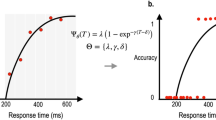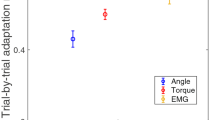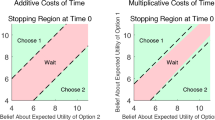Abstract
HUMAN subjects carrying out continuous performance choice response tasks are often required to correct any error by immediately making the response which they should have made. Two recent studies1,2 have shown that such “error correcting responses” are faster than other, equivalent, correct responses. In both these investigations the occurrence of any error was signalled to subjects by the equipment on which they were tested. Either the display failed to change1 or the same signal was repeated after a brief interval2. In the latter case2 the times taken to respond and correct the error were even shorter than the response times when the same signal was repeated immediately after a correct response. Nevertheless, the fact the responses to error signals were faster than responses to any other signals from the display does not lead logically to the conclusion that they are not responses to external signals. We have investigated the time taken to correct errors when no indication was given by the equipment when errors were made, so that subjects were dependent for this information on their ability to monitor their own responses.
Similar content being viewed by others
Article PDF
References
Rabbitt, P. M. A., J. Exp. Psychol., 71, 264 (1966).
Burns, J., dissert., Univ. Michigan (1965).
Bertelson, P., J. Exp. Psychol., 65, 478 (1963).
Author information
Authors and Affiliations
Rights and permissions
About this article
Cite this article
RABBITT, P. Error Correction Time without External Error Signals. Nature 212, 438 (1966). https://doi.org/10.1038/212438a0
Issue Date:
DOI: https://doi.org/10.1038/212438a0
This article is cited by
-
Early response competition over the motor cortex underlies proactive control of error correction
Scientific Reports (2022)
-
GOALIATH: a theory of goal-directed behavior
Psychological Research (2022)
-
The contributions of entorhinal cortex and hippocampus to error driven learning
Communications Biology (2021)
-
Inner Speech, Imagined Speech, and Auditory Verbal Hallucinations
Review of Philosophy and Psychology (2016)
-
Event-related potentials reflecting smoking cue reactivity and cognitive control as predictors of smoking relapse and resumption
Psychopharmacology (2016)
Comments
By submitting a comment you agree to abide by our Terms and Community Guidelines. If you find something abusive or that does not comply with our terms or guidelines please flag it as inappropriate.



